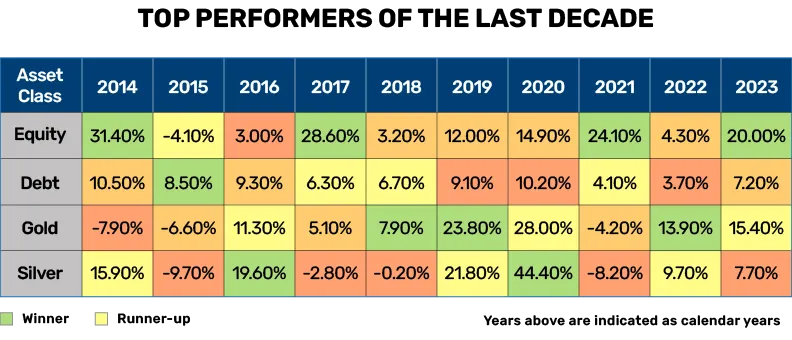List of Index Mutual Fund Schemes
Bajaj Finserv Nifty Next 50 Index Fund
Equity Fund Regular GrowthWhat are Index Funds?
Rather than seeking to beat the market, index funds seek to match its performance (subject to tracking error).
Index funds thus offer investors an easy-to-understand and cost-effective way to potentially build wealth over time.
How do index funds work?
The idea is straightforward: an index fund creates a portfolio that mirrors that of the benchmark index. It invests in the same securities in the same weightage as the benchmark.If the constituents of the benchmark change, the fund manager alters the portfolio. Because there is no active stock selection, expense ratios are relatively low. However, slight discrepancies can arise between the fund’s performance and that of the index. This difference is known as the tracking error.
Benefits of Index Funds
Index funds offer a simple and efficient way to participate in market growth. Here are some key advantages:
- Low cost: Since index funds are passively managed, they typically have lower expense ratios compared to actively managed funds.
- Diversification: By tracking a broad market index, these funds spread your investment across multiple companies and sectors, reducing risk.
- Consistent performance: Index funds aim to mirror market returns, avoiding the risk of underperformance due to poor stock selection.
- Transparency: You always know which stocks the fund holds, as they reflect the composition of the underlying index.
- Ease of investing: Index funds are ideal for long-term, hands-off investors who want a low-maintenance way to build wealth over time.
Types of index funds
Index funds can broadly be classified based on the type of indices they track. These can include Large cap index funds: Follow large cap indices such as Nifty 50, Nifty Next 50, or BSE Sensex.Mid cap and small cap index funds: Track indexes such as Nifty Midcap 150 or Nifty Smallcap 250.
Sectoral and thematic index funds: Track specific sectors such as banking or IT.
Bond index funds: Track fixed-income instruments rather than equities, making them relatively low risk.
Why invest in Bajaj Finserv AMC's index funds?
Cost efficiency: Expense ratios are lower than those of actively managed fundsLow tracking error: Fund managers seek to maintain minimal difference between the performance of the index and the fund
Diversification: Index funds provide broad market exposure through a single investment
Factors to Consider Before Investing in Index Mutual Funds
Before investing in index mutual funds, it’s important to assess the following factors to ensure they align with your financial goals:
- Investment objective: Ensure the fund’s index aligns with your risk appetite and long-term goals, be it large-cap, mid-cap, or sector-specific indices.
- Expense ratio: Even small differences in cost can affect long-term returns. Choose funds with competitive expense ratios.
- Tracking error: This measures how closely the fund follows its benchmark index. A lower tracking error indicates better index replication.
- Fund size and liquidity: Larger funds often have better liquidity and more efficient execution of trades.
How to invest in an index fund
You can invest in an index fund following these steps:2. Select a scheme:Identify the various asset management companies offering the scheme. Assess the company’s credentials and compare schemes based on tracking error, expense ratio and the fund manager’s track record.
3. Choose between lumpsum and SIP: Make a one-time lumpsum investment or invest in installments through a Systematic Investment Plan (SIP).
4. Make the investment: You can invest directly through the asset management company offering the scheme or through a mutual fund distributor.
Taxation on Index Mutual Fund
Taxation on index mutual funds in India depends on the type of index the fund tracks:
1. Equity-oriented index funds
- Short-Term Capital Gains (STCG): If units are sold within 12 months, gains are taxed at 20%.
- Long-Term Capital Gains (LTCG): If held for more than 12 months, gains above ₹1.25 lakh in a financial year are taxed at 12.5% without indexation.
2. Debt-oriented index funds
For investments made after April 1, 2023, all gains are deemed to be STCG and taxed as per the investor’s applicable slab rates.
Learn About Mutual Funds

Investing isn’t just about numbers,…

In today’s fast-paced consumerist…

When markets fluctuate significantly…

Building long-term potential wealth…

Retail participation in India’s…

Of the almost 4 crore unique…

Traditional wisdom in the mutual…

Retail investors predominantly…

A common question among investors is…

Equity, debt, gold, and silver have…

Recently, at a bustling farmers’…

Walk into your closet and take a…

You may not realise it, but when you…

Over the years, mutual funds have…

Planning for retirement involves…

Securing a comfortable post-…
Frequently Asked Questions
An index fund is a type of mutual fund that tracks a specific market index, like the Nifty 50 or BSE Sensex. The fund portfolio mirrors the composition of the index and seeks to match its performance (subject to tracking error).
Index funds can be suitable for beginners because they offer diversification and are cost effective compared to actively managed funds. Moreover, the investment approach is easy to understand.
You can invest through a mutual fund house or through a distributor, either as a lump sum or via SIP. You can also invest through aggregator platforms.
Both track indices, but ETFs trade like stocks, while index mutual funds are bought and sold directly through the asset management company at the day-end net asset value.
Index funds do well in growing markets but can decline during market downturns, just like the index they track.
Index funds aim to mirror the market, not beat it. This means they may underperform actively managed funds in certain market phases. They also carry market risk, as they move in line with the index.
Returns from index funds generally reflect the performance of the underlying index. While historical data offers some insight, actual returns can vary depending on market conditions and the fund’s tracking efficiency.
*Past performance may or may not sustain in future.
Some index funds offer Income distribution cum capital withdrawal (IDCW) payout or reinvestment options, depending on the scheme. However, IDCW payouts are not guaranteed and depend on the IDCW policy of the underlying companies in the index.
The amount you invest should be based on your financial goals, time horizon, and risk profile. It’s best to consult a financial advisor to determine what allocation works best for your portfolio.
Mutual Fund Videos: Watch, Learn, Invest

Megatrends investing means looking…
Megatrends help anticipate the…
Megatrends investing focuses on long…


